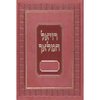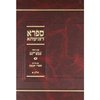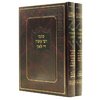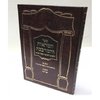La pensée reflète le miroir de nos lectures
Catégories SEFORIM (Hebrew/Hébreu) הלכה סדר היום מנוקד
Auteur/Author: Rabbi Moshe ben Yehuda MAKHIR
A commentary on the order of prayer according to the PaRDeS by Rabbi Moshe Ben Yehuda Makhir, a contemporary of the Ari’zal in 16th century Tzfat.
The author of the work, Seder HaYom, Rabbi Moshe Ben Yehuda Makhir was a resident of Tzfat and a contemporary of the Ari’zal. He served as the Rosh Yeshiva of Ayin Zetun.
An interesting point to note about Rabbi Makhir’s work is that it shows no influence whatsoever from the Ari’zal. Indeed, it records others systems of Kabbalistic practices and meditations than the Ari’zal’s system. At the time of the first publication of Seder HaYom (Venice, 1599) the Ari’zal had already passed away (in 1572) and his teachings were flourishing under the hands of Yisrael Sarug in Europe and Chaim Vital in Damascus.
For Seder HaYom not to have adopted the system of the Ari’zal indicates that its authority was not yet so widespread. Rabbi Makhir thus felt completely free to document for us other older traditions. Many of the traditions herein are unique and have no other written source. It is possible that Rabbi Makhir was writing down for posterity some of the older oral traditions of the pre-Ari Kabbalists.
Square Hebrew script. Menukad.
Commentaire sur la prière par un contemporain du Ari Hakadosh
L'auteur de l'œuvre, Rabbi Moché Ben Yehuda Makhir, était un résident de Safed et contemporain du Arizal. Il servit comme Rosh Yeshiva de Ayin Zetun.
Un point intéressant à noter à propos de l'œuvre de Rabbi Makhir est qu'il ne montre aucune influence du Arizal. Il mentionne d’autres pratiques kabbalistiques que celles du système développé par le Arizal.
Au moment de la première publication du Seder Hayom (Venise, 1599) le Ari'zal était déjà décédé (en 1572) et ses enseignements étaient disséminés par Israël Sarug en Europe et Haïm Vital à Damas.
Le fait qu’il n’ait pas adopté le système du Arizal smble indiquer que son autorité était pas encore si répandue. Rabbi Makhir se sentait donc totalement libre de documenter pour nous d’autres traditions anciennes. Beaucoup de traditions mentionnées n’ont aucune autre source écrite. L’auteur à laissé à la postérité quelques-unes des traditions orales kabbalistiques datant de l’ère pré-Arizal.
Script hébreu carré menoukad.
Les clients qui ont acheté ce produit ont aussi commandé
|
רזיאל המלאך בינוני
10,00 €
Poids du colis: 0,28 kg
|
Poids du colis: 2,55 kg
|
כתבי רבי משה די לאון
58,00 €
Poids du colis: 2 kg
|
|
המראות והמרכבה
29,00 €
Poids du colis: 0,85 kg
|
Parcourir également ces catégories : הלכה, קבלה, תפילה





